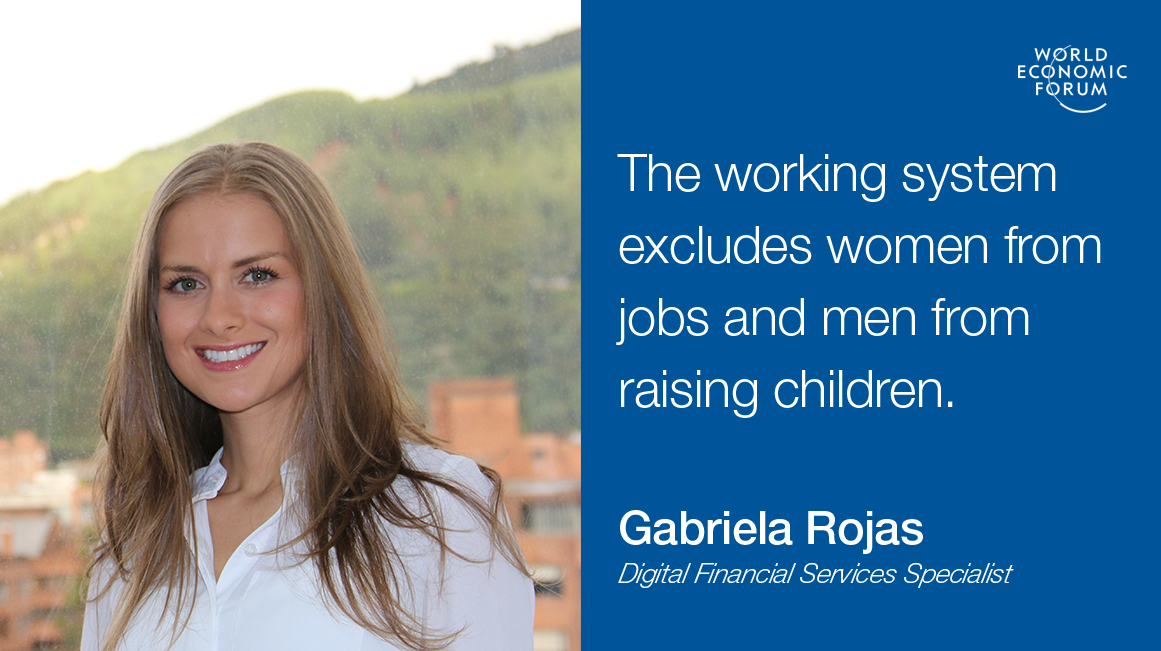
This article originally appeared on the World Economic Forum's website & was named as a top blog of 2017.
It is assumed that the happiest moment in a couple’s life is when they find out they are pregnant but, as pregnancy gets underway, gender inequality becomes more evident.
My husband and I got pregnant in late 2015. I was starting a new job and my husband was working on a merger. I felt scared and worried about what my new boss was going to say, while my husband was relaxed and happy. He gave the news with joy to everyone at work, because for men, expecting a baby has no implications for their careers.
As many pregnant women experience, my “baby alert” turned on. Every time I was in my car or walking, I started observing not only babies, but also the harsh reality in Latin America that out of every 30 babies I saw, only one was accompanied by a man. I counted. Then I realized all the advertisements were aimed at mothers-to-be, not fathers-to-be. And, as the birth was approaching, I found out that maternity leave in Colombia was 12 weeks long (now it is 16 weeks), while paternity leave is only 8 days.
'I was told to quit, my husband to work harder'
My son was born and the reality became worse than those tiny signals. While I was working remotely, for only a few hours a week, my husband was working more than 40 hours a week. I was often invited by other people to quit my career, while my husband was told to work harder.
So I started asking myself many questions: why, if we did this together, am I raising my son alone? Why can’t my husband spend more time with us? What’s going to happen to the father and son bond? Why have so many aspects in my life and career changed, while his life is almost the same? Why, if I want to go back to work, must I find someone to raise my child? Why can’t we do this 50/50? So here was where our journey towards parenting parity began.

The traditional working system has many failures that prevent gender parity, but in my opinion one of the biggest is the assumption that women must raise their children and men must play a back-up role. Under this assumption, all women are potential mothers, and this represents all the time-consuming implications that motherhood entails. So in this capitalist system, where time equals money, women are considered a riskier asset than men, and for this reason they are less likely to be hired.
Despite this, in the corporate world there are a few good examples where parental leave policies are break the rule and offer equal conditions not only for straight but also for same sex couples. For instance, two of the most outstanding cases are Netflix and Bill and Melinda Gates Foundation, giving new parents up to one year of paid leave.
In developed countries like Sweden, Denmark, Norway, there are government initiatives that promote fair parental leave policies; however, just a few of them have equal conditions for women and men.
Unfortunately, in developing countries like Colombia and in most of the companies in the world, the working system is designed to exclude women from the labor world and men from raising children.
Re-imagining gender roles
After being confronted by this unequal world and asking myself the many questions I listed above, my husband and I decided to re-imagine our roles, not only as parents but also in our working system and society.
My husband made the decision to leave the corporate world because, among other reasons, it was not compatible with the type of family we wanted to create. He started a new company, within which he aims to create gender parity policies for all of his workers.
I work as a consultant so I can manage my time. This year I decided to start working more hours a week. I go to the office three days a week and the other days I work from home; and my husband does the same. We are constantly improving our 50/50 roles model to keep up our careers and to build our family together.
Unfortunately, we are an exception to the rule and not everyone has the opportunity to have this balance. For this reason we advocate for a working system that can enable opportunities for all women and men to decide the type of parenting model they want and under the balance they choose.
Historically the labor system has undergone different reforms to meet people’s needs. Now it is time to reform the parental policies to continue building an egalitarian society. This is an outstanding debt we as a society have to the children, women and men who demand a new family model.
If we break this paradigm in the working system, there will be an important social change in which fewer women will be excluded from the labor market and more men will have the opportunity to be actively present in the development of their families.
Gabriela Rojas is a Specialist in Digital Financial Services for the International Finance Corporation (IFC). She is a OYW Ambassador from Colombia.


